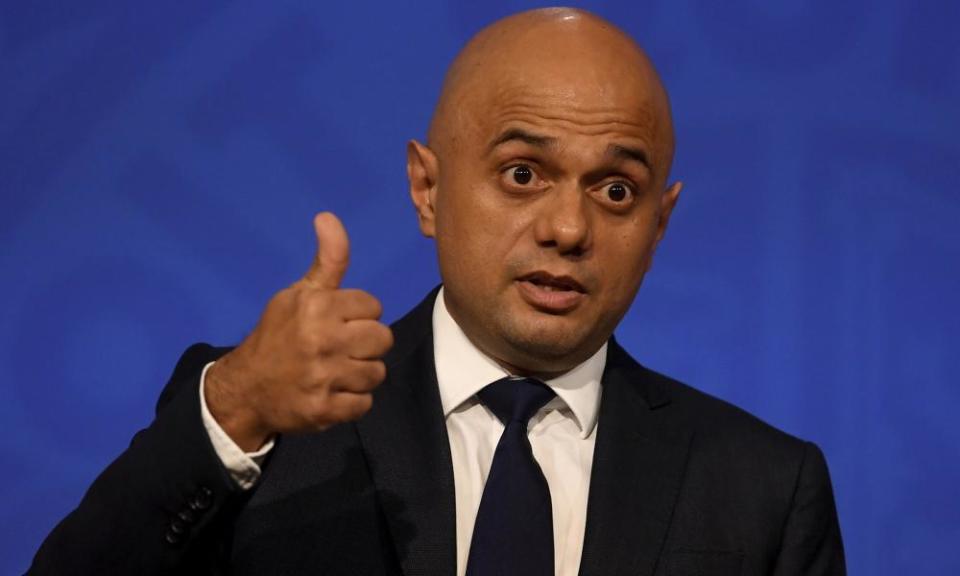Yes, we have to live with Covid – but not with such irresponsible ministers

When the official inquiry into the Covid-19 crisis finally happens, the current phase of the pandemic will warrant as much scrutiny as any of the earlier ones. It’s surely the strangest and in some ways the most disturbing period of the pandemic so far, not least because there seems to be collective denial from the government and much of the public that we are still in a pandemic at all.
Some statistics might help to correct any such fantasies. Since mid-August, as many people in the UK have been dying from Covid every two weeks as typically die directly from flu in a year: that’s 1,400 or so. The UK has one of the highest per capita infection rates in the world: four times higher than Germany, nine times higher than France, and 25 times higher than Spain. Britain is a total outlier in western Europe.
Related: Complacency slowing England’s Covid booster jabs rollout, says NHS leader
By the start of October, 1 in 20 schoolchildren were Covid-positive. Already, before winter sets in, the NHS is struggling to cope with hospitalisations – one in five intensive care beds are occupied by Covid patients – while still having a backlog of more than 5m delayed treatments to clear.
The chief executive of the NHS Confederation, Matthew Taylor, said today, “We are right on the edge”, and called for the government to implement its Plan B for Covid. This would entail compulsory masks in indoor spaces and secondary schools, vaccine passports and advice to work from home. None of these things would cause significant economic disruption: no one is calling for a lockdown. They could mostly be implemented tomorrow.
They won’t be, as the business secretary, Kwasi Kwarteng, indicated today. Downing St says it is keeping a “close eye” on the situation – which makes you wonder what they would need to see before acting. This complacent attitude was exemplified by the health secretary, Sajid Javid, who reassured us recently that the infection rate “feel[s] quite stable”. As though the relatively massive absolute numbers – well over 40,000 new infections recorded every single day, which he now admits could hit 100,000 this winter – don’t matter so long as they don’t change.
Remarkably, that attitude seems to be widely accepted: that, all evidence to the contrary, the pandemic is all but over, masks are no longer needed (except as virtue-signalling), and life must resume as before. Such complacency among the general public is understandable, given the message delivered not just by the government but by much of the media since mandatory restrictions were dropped on so-called Freedom Day back in July.
Of course, the reasons why this seeming indifference is even possible is the vaccines. Most of the deaths, adjusted for age, are among unvaccinated people, who run at least a tenfold higher risk. But in absolute numbers, by far the majority of deaths are still in older people, despite them being vaccinated. According to Prof Christina Pagel, an expert in healthcare policy at University College London, a double-vaccinated 80-year-old may have about the same risk of dying from Covid as an unvaccinated 50-year-old.
Besides, the prevalence and debilitating consequences of long Covid are now becoming clear: around two million Britons, and as many as one in seven children, are thought already to have long-lasting Covid symptoms, and many doubly vaccinated people will probably not be protected from that danger.
And the sheer numbers of infected people broaden the pool of virus in which new variants can arise. Already, a new variety of the Delta variant called AY.4.2 has appeared that might be marginally more transmissible. No one knows how much scope remains for new variants to become more contagious or virulent, but the best way to avoid that risk is to keep infections low.
We have been encouraged to regard Covid-19 as a kind of natural hazard about which we can do nothing more. But, as the rest of western Europe shows, there was never anything inevitable about our predicament. It was a political choice. As Jeremy Farrar, a member of Sage and director of the Wellcome Trust, has said, it is politics that stops Conservative MPs from wearing masks in parliament. The light-touch, low-cost measures of Plan B are being resisted because they might signal a policy failure and would arouse indignation on the right.
Despite clear advice to the contrary, the government still appears to believe that vaccines, which gave them such a shot of popularity, were a get-out-of-jail-free card that requires them to do nothing else.
When Javid and Kwarteng say that we have to learn to live with the virus, they are right in one sense: the most probable trajectory is that Covid won’t vanish but will establish itself as an endemic pathogen, like flu viruses. But they are deeply mistaken if they think, as it seems, that this means going about life as before the pandemic.
For the foreseeable future, “learning to live with Covid” should mean taking measures to prevent transmission – such as wearing masks in indoor public places and working from home where possible – and reintroducing further temporary restrictions should cases spike in certain parts of the country. Populist politicians don’t feel comfortable with that; the question is whether the rest of us feel comfortable with the current, lethal alternative.
Philip Ball is a science writer. His books include The Water Kingdom: A Secret History of China

 Yahoo Movies
Yahoo Movies 